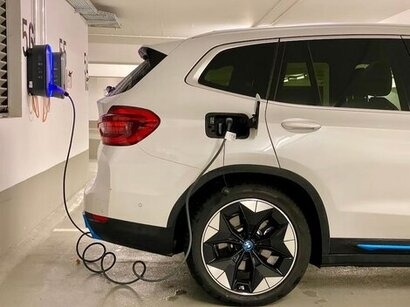
The measures include a commitment of nearly £400 million to accelerate electric vehicle charging infrastructure rollout across England. This follows the publication of its zero emission vehicle mandate which sets ambitious targets for the sale of new zero emission cars and vans sold, and kickstarting a more competitive EV market. The government will also boost the production and use of sustainable aviation fuel (SAF) through the second round of the £165 million Advanced Fuels Fund and launch of SAF mandate consultation.
The measures are aimed at supporting the shift to electric vehicles (EVs) as well as the production of sustainable aviation fuel in the UK – continuing the country’s transition towards net zero.
The £381 million Local Electric Vehicle Infrastructure (LEVI) fund, alongside an additional £15 million for the On-Street Residential Charging Scheme (ORCS), will support the installation of tens of thousands of new chargers across the country, increasing EV infrastructure in every area and ensuring the UK’s charging network can support the increasing number of EV drivers and those considering the switch.
“Transport is one of the most important sectors for achieving net zero by 2050, and so we must accelerate our efforts to decarbonise how people get from A to B while growing our economy and supporting thousands of green jobs” said Transport Secretary Mark Harper. “From expanding our charging network to boosting the production of cleaner aviation fuel, today’s announcement is a great stride forwards - offering people more choice on how to stay connected while delivering the carbon reductions needed to achieve net zero.”
The Government has also unveiled its proposals for a world-leading zero emission vehicle mandate which, from next year, will set minimum annual targets for the percentage of new car and van sales that must be zero emission. The proposed mandate makes the UK’s path to zero emission vehicles the fastest in Europe.
The plans support the Government’s commitment to end the sale of new petrol and diesel cars and vans by 2030, and from 2035 all new cars and vans must be fully zero emission at the exhaust. Between 2030 and 2034 all new vehicles must be either fully zero emission or be able to drive a significant distance with zero emissions.
The final proposals are being jointly consulted upon by the UK Government, alongside Scotland, Wales and Northern Ireland, and are the single largest carbon saving measure identified in the Government’s Net Zero Strategy.
The measures build on the progress already made in the transition to electric vehicles, with almost 17 percent of new cars sold last year being zero emission – supporting thousands of high-skilled jobs in the sector and helping to the country to reach its net zero targets.
The new measures will support the wide range of manufacturers in the sector by giving them flexibility through a credits-based trading system, enabling them to bank credits in years when they exceed annual targets for use in future years or trade them with other manufacturers who have fallen short. If manufacturers do not meet their yearly targets, they could face possible fines of up to £18,000 for every vehicle they miss their target by.
Technology and Decarbonisation Minister Jesse Norman said that the Government is doing more than ever to help the UK move away from petrol and diesel and towards electric vehicles.
“That means investing in charging infrastructure and giving a clear direction to manufacturers so they can roll out new electric vehicles faster and more efficiently” Mr Norman added. “Overall, the UK is leading the way in decarbonising transport, a sector that is one of the biggest contributors to greenhouse gases.”
The announcement provides long-term certainty to industry, increasing the number of zero emission cars available for people to buy and setting a clear direction for operators to accelerate the installation of chargepoints. With a greater proportion of zero emission vehicles on the UK’s roads, more drivers will benefit from lower overall running costs against their petrol and diesel counterparts. This will support a cheaper second-hand EV market, while improving air quality across the country for everyone.
At current rates, aviation would become one of the largest emitting sectors by 2050, which is why it’s imperative the Government takes action. The Government is therefore today opening the second application round of the £165 million Advanced Fuels Fund, which will help deliver on the commitment for the UK to have at least five commercial scale UK SAF plants in construction by 2025.
The production and use of sustainable aviation fuel (SAF) in the UK is central to the Jet Zero Strategy. SAF can reduce greenhouse gas emissions by over 70 percent whilst boosting investment, jobs and fuel security.
For additional information:

